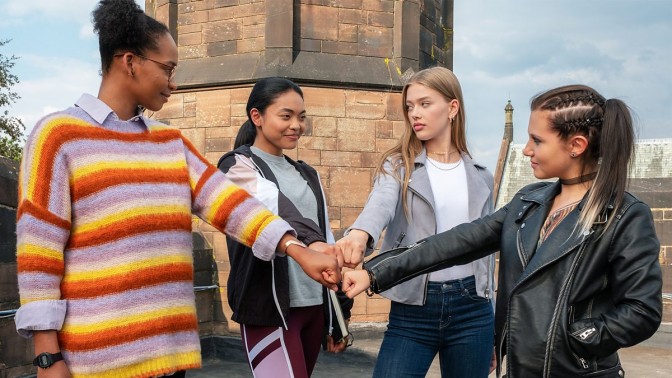NME Music News, Reviews, Videos, Galleries, Tickets and Blogs | NME.COM
Get Even is a British teen drama based on a book of the same name by Gretchen McNeil. The show premiered in the UK earlier this year on BBC iPlayer.
The series follows four girls at an elite private school, all from different cliques, who band together as the anonymous D.G.M. to fight injustice at the school and take down bullies. The show is reminiscent of classic teen mystery thrillers such as Pretty Little Liars and Riverdale, however, Get Even sets itself apart with its British setting and cast as well as the racial diversity. The four main characters are Kitty Wei (British Asian actress Kim Adis), Bree Deringer (Mia McKenna-Bruce), Margot Rivers (Black British actress Bethany Antonia) and Olivia Hayes, (Jessica Alexander). Aside from the main characters, there is racial diversity across the cast of Get Even, with many of the side characters also being people of colour with similar levels of nuance in their characterisations.
People of colour deserve to see themselves represented in stories that aren’t just about their race/marginalisation, and so it is very refreshing to see a mainstream TV show like Get Even presenting an accurate portrayal of the diverse world we live in.
But despite the wonderful representation in the show, this is far from the case in most mainstream media. Actor Mena Massoud, known for playing the title role in Disney’s live action adaptation of Aladdin, recently opened up about his struggles of finding work after the movie. Despite the movie’s success, with a total box office of more than $1billion, Massoud has not been able to find another major role since the movie’s release last year. In an interview with the Daily Beast, Massoud said: “I’m kind of tired of staying quiet about it… I want people to know that it’s not always dandelions and roses when you’re doing something like Aladdin. ‘He must have made millions. He must be getting all these offers.’ It’s none of those things. I haven’t had a single audition since Aladdin came out.” And Massoud isn’t the only actor that highlights the industry’s diversity problem. The star of Killing Eve, Sandra Oh, discusses the lack of diversity in the industry, stating, “You could always feel that you were the quota.” A sentiment that stems from the way actors of colour are tokenised, taken in as the one diverse member on a set and used to essentially place a Band-Aid over a gaping systemic wound in the industry. Witnessing so many talented actors of colour come forward about the treatment they receive and the work they are denied is not only disheartening, it is unfortunately unsurprising.
Get Even turns this around with having two of the four of the leading roles being played by actresses of colour who are not quotas and have layered personalities and lives. Kitty Wei is a student on a scholarship who loves sport and wants to not only do well for herself but also to make her very loving parents proud. She is flawed and doesn’t always do the right thing but is also a fierce friend. Margot Rivers is American and struggles with anxiety and making friends, but as the episodes progress she grows and even has a romantic interest or two. Both of these characterisations subvert tropes and stereotypes, especially with Margot’s character who is dark skinned and is allowed to be vulnerable and loved on the screen. Something that is hardly ever the case in media.
While the industry still has a long way to go, there have been slow improvements in mainstream TV and Film over the years. Groundbreaking shows such as Get Even, How To Get Away With Murder and Brooklyn 99 – as well as movies like Black Panther, Crazy Rich Asians and To All the Boys I’ve Loved Before. They were all commercial hits, showing the industry that stories centring the lives of people of colour do well and can be extremely successful.
Get Even gets representation right by not having the characters of colour be tokens in a white persons story like we are so used to seeing in so many dramas. For the first time, not only are the main characters people of colour, but there are also incredible side characters such as mean girl Amber, portrayed by Black British actress Razan Nassar, and popular jock Donte, portrayed by Black British actor Chris J Gordon who both get their own interesting storylines. Get Even is a show that reinforces the fact that people of colour are not a monolith and can portray a wide range of characters excellently.
TV is meant to be an entertaining depiction of the realities in which we live, but this isn’t possible or accurate if only some people’s realities are shown and others minimised or hidden completely. In future more series should strive to not only have BIPOC (Black, Indigenous, and People of Colour) in their main casts, but also behind the camera and to understand that without diversity there is no moving forward or making the world a better and more inclusive place.
‘Get Even’ is streaming now on BBC iPlayer
The post In case you missed it: ‘Get Even’ is the BBC teen drama that gets representation right appeared first on NME Music News, Reviews, Videos, Galleries, Tickets and Blogs | NME.COM.
